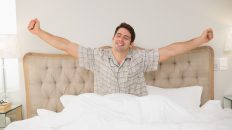By Virginia Gurley, MD, MPH
MB (Marc Braman, MD, MPH):
Our topic this session is “Shift Work And Sleep”. Thank you for joining us, Dr. Gurley.
VG (Virginia Gurley, MD, MPH):
Thank you, Dr. Braman.
MB:
So can you introduce the topic for us? What are we talking about?
VG:
Night shift work is a work schedule that overlaps with normal sleep times, that is, work times that fall roughly between 10:00pm and 6:00am. And night shift work is pretty common. About 20% of U.S. workers do night shift work with some regularity.
MB:
So I’ve done some occupational medicine and have ended up treating a lot of patients who work some really strange hours, and sometimes they change quite a bit. I know this is definitely true in the hospital setting.
VG:
Yeah, rotating night shift work alternates between typical work hours, like between 7:00am and 7:00pm, and night time work hours like I said, between 10:00pm and 6:00am. So routine night shift workers have a consistent work schedule, and that schedule always overlaps with a normal sleep time, but it’s not shifting back and forth.
MB:
That makes sense. My impression is that the constant change is a lot harder on people than regular night work. Is this true?
VG:
Yes, research suggests it’s harder for your body to do rotating night shift work because flipping back and forth between the two schedules keeps your body from ever adjusting. This really throws off all your body’s timing processes for knowing when to do its restorative and repair work.
MB:
So what kinds of problems come from night shift work?
VG:
Well even if you work a steady night shift schedule, being out of synch with the normal day-night cycle of the sun makes it harder for the bodies clocks to regulate their repair work. Some people are called “work shift intolerant” which means they are unable to get sufficient sleep during the day so that they can perform safely and effectively during work at night.
MB:
So this is starting to sound like something we might compare with a blood/alcohol level, relative to impairment. Do we have a medical label for some of these problems, and what does this look like?
VG:
So there is a condition called “shift work syndrome” where someone is working during the night, but not able to sleep during the day despite spending enough time in bed to get enough sleep. People with “shift work syndrome” also experience a lot of fatigue due to their insomnia and inability to sleep during the day.
MB:
Other than the immediate and obvious problems of lack of sleep, what impact does this chronic sleep disruption have on our health?
VG:
Yeah there are some pretty profound impacts. So the World Health Organization actually classifies night shift work as a risk factor for high blood pressure, for obesity, for diabetes, and even for some forms of cancer, like breast cancer, prostate cancer, and some blood cancers.
MB:
So this is actually pretty serious, these are large impacts and serious conditions. Obviously some of us have to work at other-than-ideal hours. What can our listeners who work nights do to maximize their health and minimize negative effects of shift work?
VG:
Yes, there definitely are ways to cope with night shift work that help counteract the negative effects on the body. The most important of which is simply making time for at least 7-8 hours of sleep each day. And that’s easier said than done because along with making time for sleep, people who work night shifts can find it difficult to find time to be with family and friends without cutting into their sleep time.
And another aspect of sleep timing that is especially important if you do rotating night shift work is to get a good sleep before your night shift. So many people will go straight into a night shift without any sleep time beforehand and in effect be awake for close to 24 hours straight.
MB:
Wow, yeah that would be a problem. What else might we do to best manage our sleep and make it the most healing or restorative possible?
VG:
Yeah, recovery sleep after the night shift is also really key. Since many night shift workers finish around sunrise, and that early morning light is a signal to the brain to stay awake and be alert, that alerting effect from the sun can make it really hard to sleep. And wearing amber glasses from the end of the shift until you go to bed can really help the body get much more restful, restorative sleep.
MB:
So essentially make a sunset from what you’re seeing, and maybe employers should just dispense amber glasses as part of shift workers standard equipment. It’s sort of a funny thought.
VG:
Yeah, that’s a great idea.
MB:
And a big thank you to those of you who do have to work these tough hours.
In our next session we are going to get into some practical details and essentially a prescription for sleep for shift workers.
Thank you, Dr. Gurley.
VG:
Thank you, Dr. Braman.
Impacts of shift work on sleep and circadian rhythms. Boivin DB, Boudreau P. Pathology Biologie. 2014;62:292-301. doi:10.1016/j.patbio.2014.08.001.
Shift work and cancer: The evidence and the challenge. Erren TC, Falaturi P, Morfeld P, Knauth P, Reiter RJ, Piekarski C. Dtsch Arztebl Int. 2010; 107(38): 657-62. doi:10.3238/arztebl.2010.0657.
Shift work: health, performance and safety problems, traditional countermeasures, and innovative management strategies to reduce circadian misalignment. Smith MR, Eastman CI. Nature and Science of Sleep. 2012. 4:111-132, doi:10.2147/NSS.S10372.





